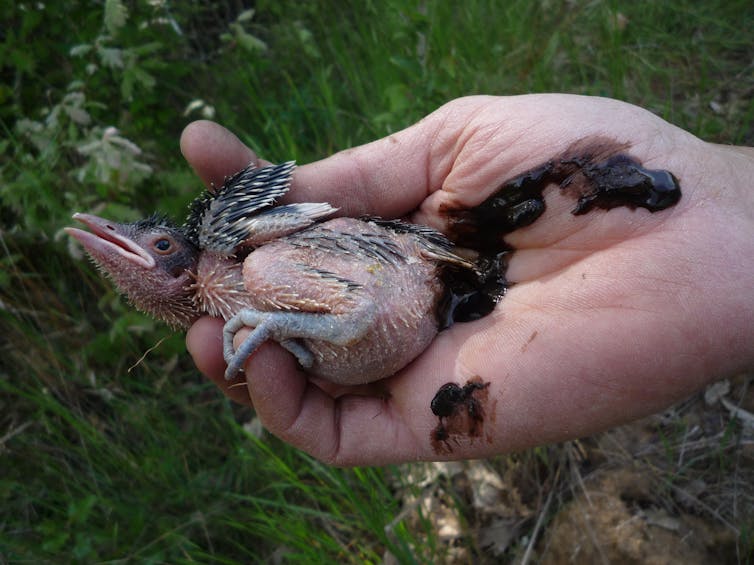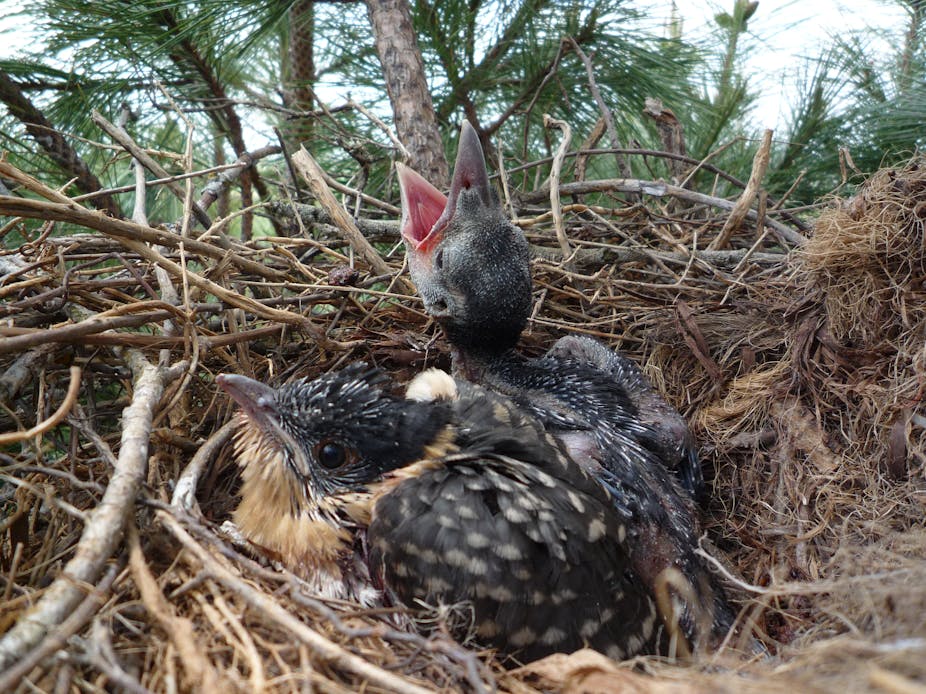If you come across a young cuckoo this summer, you’ll be witness to one of the most bizarre sights in nature. Cuckoo chicks are interlopers in the nests of other species, and can be seen being frantically fed by their unwitting foster parent, despite often being clearly many times larger than their hosts. It makes you wonder: why on earth does this bird expend so much energy raising such clearly unrelated offspring? The clue comes from thinking about this puzzle in terms of costs and benefits.
Raising a cuckoo chick often occurs at the expense of host chicks. Common cuckoo chicks, for example, famously remove any host eggs or young from the nest within days of hatching. Chicks of a few other cuckoo species however will grow up alongside their host’s own offspring. Yet they still remove competition – magpie host chicks often die of starvation because, for example, great spotted cuckoo chicks beg to be fed more intensely.
But parasitism may not always be costly. Great spotted cuckoos are also parasitical on carrion crows, but as crow chicks are much larger than cuckoos they are never out-competed and crow parents always manage to raise a few young of their own. For magpies, parasitism by cuckoos is costly, for crows it is less so.
So while magpies drive cuckoos away from their nest, or recognise foreign eggs and remove them, crows do not. But surely, even when costs are low, there is an evolutionary advantage to avoiding raising someone else’s chick.
In the late 18th century the German ornithologist Johann Bechstein presented a different idea. Instead of hosts being taken advantage of, he proposed that they were “beside themselves for joy” at the opportunity to raise a cuckoo chick. It was “an honour” to care for it. Modern biologists pooh-pooh this notion, because self-interest, not generosity, is the currency of evolution by natural selection. However, the results of a 16-year study published in the journal Science suggests he might have been on to something.
By looking at the relationship between these species differently, the study, led by Daniela Canestrari, reveals that crows do not defend themselves because they actually benefit from having a cuckoo in the nest. Combining data collected over 16 years with careful field experiments, the study shows that nests containing cuckoos produce more crow chicks than those without. Better yet, the authors show how this entirely counter-intuitive conclusion is reached.

When disturbed, great spotted cuckoo chicks emit copious amounts of a sticky, smelly substance. The authors tested the novel hypothesis that this stinky substance deters predators from the nest. If cats and hawks were given tasty pieces of chicken meat, but smeared with the cuckoo’s excretion, these typical nest predators were repelled. This indicates that the cuckoo’s excretion is a very powerful defence mechanism, likely to save both cuckoo and crow chicks alike if a predator comes calling.
So although crows appear to be behaving generously towards cuckoos, they are in fact still selfish – they tolerate cuckoos because of the benefit they provide their own young.
But do crows “welcome” cuckoos, as Bechstein suggested? It’s probably a little more complicated than this. Crows nest communally – their bushy nests often visible by the score in the bare branches of trees – and a previous study at this same field site showed that larger groups of crows’ nests are less likely to be parasitised by cuckoos. If raising a cuckoo is so beneficial to the survival of crow chicks, we’d expect the opposite. Perhaps having other crows to help raise chicks also helps to deter predators – the benefit of the cuckoo excretions no longer outweighs their cost.
Of those cuckoo species that do not evict their nest-mates, many also emit similar smelly fluids. So this study shows that it might be time to revisit our conclusions as to why their hosts have not evolved defences also. In areas where there are many predators, even the smallest advantage conferred by a cuckoo chick may be sufficient to obstruct the natural evolution of defences in the host species.
In the past when we have discovered brood parasite hosts with no apparent defences towards parasitism, we have come to a different conclusion. Perhaps these hosts will evolve defences, but there has not yet been sufficient evolutionary time to do so – the hosts are lagging behind. While plausible, such explanations are rarely satisfying as they are almost impossible to test or falsify. Daniela Canestrari and her colleagues however, have now done just this. Although smelly, theirs is a much more satisfying explanation.

